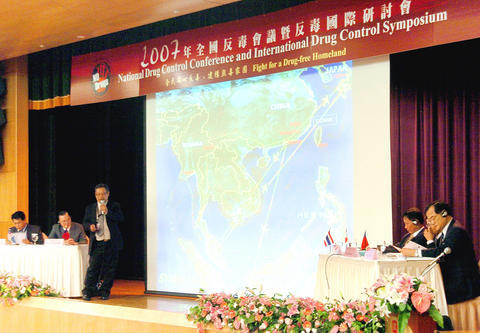A narcotics control officer said yesterday that minor, or cheaper, drugs have become the major narcotics used in the country, with an increasing number of teenagers and youths becoming addicted.
"Heroin, amphetamines and Ketamine are the three major drugs used in Taiwan, and the use of Ketamine is becoming more widespread in the nation," said Wang Hua-fu (王華富), director of the Narcotics Control Center at the Ministry of Justice's Investigation Bureau.
Wang made the remarks at the two-day International Drug Control Symposium, which concluded yesterday. The event was co-sponsored by the ministry.

PHOTO: LU CHUN-WEI, TAIPEI TIMES
Citing statistics from the ministry, Wang said Ketamine has become the number one narcotic among drugs seized in the country in terms of quantity since it was first listed in 2002 as a class-three drug -- also known as a "minor" drug.
Acknowledging that the use of minor drugs was on the increase among teenagers, Wang said youths frequently take class-three drugs like Ketamine, MDMA (ecstasy) and flunitrazepam, which have detrimental effects on health and relationships.
New kinds of banned substances, such as ecstasy pills, flunitrazepam, nimetazepam, zolpidem and surazepam, have been discovered by police during raids on bubble tea houses, KTV parlors, bars and night clubs, Wang said.
There is a rising trend among drug users to take several kinds of illicit drugs at one time to enhance the effect, he said.
Compared with traditional drugs, the emerging synthetic drugs are cheaper and more lucrative because of their low production costs, which increases the potential of them being used by a greater number of people in future, he warned.
The official said that amphetamine use is also on the increase in the nation.
Since China started cracking down on its amphetamine factories in 2002, Taiwanese drug traffickers have smuggled the drug from Southeast Asian countries, he said.
Wang called for more intensive international cooperation to fight drug production and transportation.
Following the discovery recently of a number of amphetamine production factories in the nation, Wang said that enforcement officers were seeing a trend of criminals producing amphetamine domestically rather than smuggling it.
Narcotics control officers and experts from a number of countries around the world were in attendance at the conference yesterday to discuss strategies for the promotion of international cooperation in the fight against drugs.
Participants agreed that only intensive international cooperation could reduce the flow of narcotics.
Sukhum Opasniputh, a division chief under Thailand's Narcotics Control Commission, said the number of international traffickers arrested in Thailand had dropped over the last few years as a result of strong enforcement action, tighter laws and greater regional cooperation.
Eiyoshi One, a Japan Coast Guard division chief in charge of international organized crime, said that as a country surrounded by sea, an intensive coastal patrol had been the major effort launched to crack down on drugs trafficking.
Additional reporting by CNA

Eight restaurants in Taiwan yesterday secured a one-star rating from the Michelin Guide Taiwan for the first time, while three one-star restaurants from last year’s edition were promoted to two stars. Forty-three restaurants were awarded one star this year, including 34 in Taipei, five in Taichung and four in Kaohsiung. Hosu (好嶼), Chuan Ya (川雅), Sushi Kajin (鮨嘉仁), aMaze (心宴), La Vie by Thomas Buhner, Yuan Yi (元一) and Frassi in Taipei and Front House (方蒔) in Kaohsiung received a one-star rating for the first time. Hosu is known for innovative Taiwanese dishes, while Chuan Ya serves Sichuan cuisine and aMaze specializes

Taitung County is to launch charter flights to Malaysia at the end of this year, after setting up flights to Vietnam and Thailand, the Taitung County Government said yesterday. The new charter flight services, provided by low-cost carrier Batik Air Malaysia, would be part of five-day tour packages for visits to Taitung County or Malaysia. The Batik Air charter flight, with about 200 seats, would take Malaysian tourists to Taitung on Dec. 30 and then at 12:35pm return to Kuala Lumpur with Taiwanese tourists. Another charter flight would bring the Taiwanese home on Jan. 3 next year, arriving at 5:30pm, before taking the

Taiwan High Speed Rail Corp. (THSRC) plans to ease strained capacity during peak hours by introducing new fare rules restricting passengers traveling without reserved seats in 2026, company Chairman Shih Che (史哲) said Wednesday. THSRC needs to tackle its capacity issue because there have been several occasions where passengers holding tickets with reserved seats did not make it onto their train in stations packed with individuals traveling without a reserved seat, Shih told reporters in a joint interview in Taipei. Non-reserved seats allow travelers maximum flexibility, but it has led to issues relating to quality of service and safety concerns, especially during

An exhibition celebrating Taiwan and Japan’s comic culture opened on Saturday in Taichung, featuring a section that explores Taiwanese reproductions of Japanese comics from when martial law limited Japanese representation. “A Century of Manga Culture: An Encounter of Taiwan and Japan’s Youth” held its Taiwan opening ceremony at Taichung’s National Taiwan Museum of Comics after an initial one-month run in Japan’s Kyoto International Manga Museum between May 24 and June 24. Much like the Kyoto exhibition, the show mainly celebrates the comic connection between Taiwan and Japan through late Taiwanese comic book